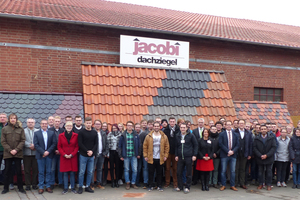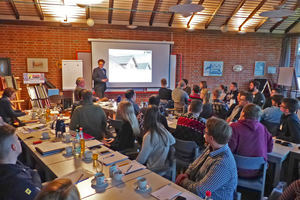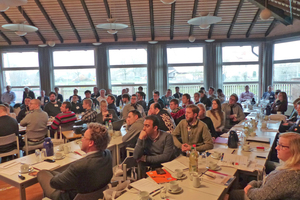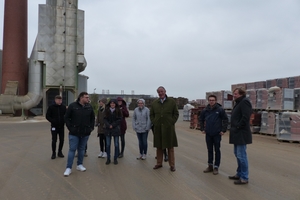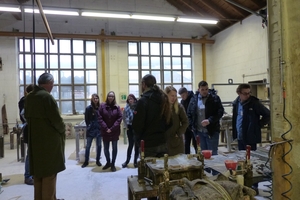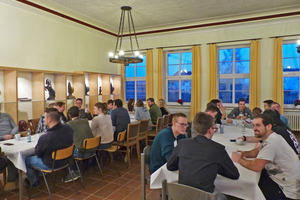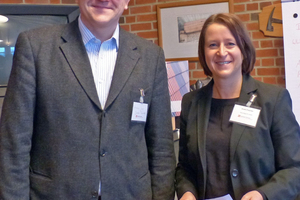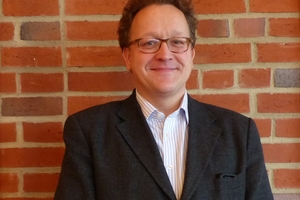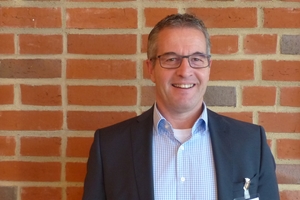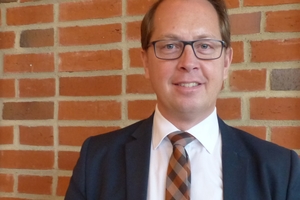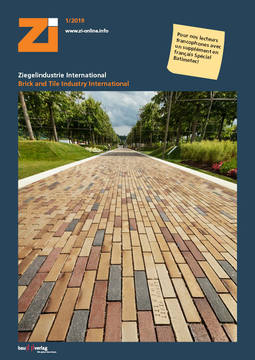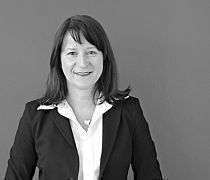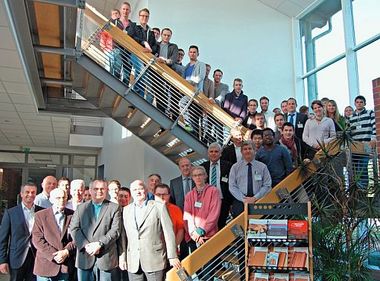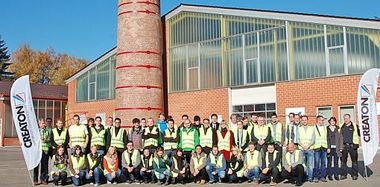Roofing tile production enthrals students on the Zi 2018 field trip
As part of the field trip arranged by the trade journal Zi Brick and Tile Industry International on 20 and 21 November 2018, more than 40 students and their supervisors visited Jacobi Tonwerke GmbH in Bilshausen, Germany. In the programme of talks, six industry partners informed the students about their companies and career opportunities as well as presenting current topics in the industry. The tour of the plant gave the students insights into the production of clay roofing tiles, from manual tasks to automated manufacturing.
In 2018, a visit to Jacobi Tonwerke GmbH headlined our programme.
As part of our student field trip, we visited one of the biggest family-run SMEs in the German clay roofing tile branch. Aim of this now fifth such field trip is to get future university graduates in Materials Engineering and Ceramics interested in the heavy clay industry.
On 20 and 21 November, students and industry partners from the brick and tile industry and its supplier sector met in Bilshausen. Under the direction of Prof. Dr.-Ing. Christian Schäffer from Koblenz University of Applied Sciences, Glass and Ceramics Engineering, Höhr-Grenzhausen, and Prof. Dr W. Krcmar from the Georg Simon Ohm University of Technology in Nuremberg, students found out about career opportunities in the heavy clay industry as well as with its suppliers.
Six industry partners supported us in getting the young scientists and engineers interested in our industry, for some of them, it was their fifth time supporting the event:
Grothe Rohstoffe GmbH & Co. KG, Bückeburg
Hans Lingl Anlagenbau und Verfahrenstechnik GmbH & Co. KG, Krumbach
Keller HCW GmbH, Ibbenbüren
Petersen Service GmbH/Rehart GmbH, Netphen/Ehingen
Refratechnik Ceramics GmbH, Melle
As a newcomer to the event this year, we were able to welcome Stephan Schmidt KG, which also wants to step up its activities to attract young specialists into the branch.
It is thanks to the commitment of these companies that senior students can get to talk to potential employers already during their studies. For the participating companies, it is a chance to get future graduates interested in their companies early on. As part of the field trip, the students receive both technical information in specialist talks and an overview of the companies with the career opportunities within them.
With Prof. Dr. rer. nat. Wolfgang Krcmar, Georg Simon Ohm University of Technology in Nuremberg, Department of Materials Engineering, and Prof. Dr.-Ing. Christian Schäffer, Koblenz University of Applied Sciences, WesterWaldCampus, Department of Glass and Ceramics Engineering, we have found partners who have taken part in the field trip with their students since the very first trip and contributed to the success of the event.
The Jacobi group of companies had immediately said yes to our enquiry as the topic of future specialists is also extremely important for the roofing tile manufacturer. We are indebted to the Jacobi management, especially Helmuth Jacobi and Dominic Jung, and the Jacobi team, who all provided us with such excellent support.
Following the opening address by Zi editor Anett Fischer, Dominic Jung, part of the management team and responsible for purchasing, human resources and energy, welcomed all the participants. He was delighted to present the tradition-steeped roofing tile factory to the future professionals. Founded in 1860, today the fifth and sixth generation of the family are responsible for its running. While the company used to produce backing bricks, clinker bricks, brick slips and roofing tiles, today the total of 440 employees only make roofing tiles, though these in a huge range of sizes and colours. For Jung, the specific advantages of a family company are the short decision paths and fast problem solutions. The employees’ affiliation to the company was often very long.
One concern at Jacobi is the careful use of resources. That is why the company has invested in a modern cogeneration unit, which was put into operation in Bilshausen in late 2016. This is used to independently produce part of the electricity needed and save energy.
Jung informed the students about Jacobi’s extensive range of products. One outstanding characteristic was that the company developed and produced its own engobes and glazes. The current colour trend was, with more than 50%, grey and black shades. Jacobi also makes speciality products, such as so-called “steamed” (refired in oxygen deprivation conditions) and salt-glazed roofing tiles, for instance for the preservation of historical buildings. Depending on the articles, the products are made both by hand and on fully automatic equipment.
It all started with the clay
Helmuth Jacobi opened the series of talks with a review of the development of the Jacobi roofing tile plants.
Clay as the raw material was recurring theme in his remarks. It all began with the acquisition of the Ratsziegelei, a brickyard in the town of Duderstadt, by Josef Jacobi in the year 1860. In this brickyard for handmade bricks, young clays were processed with rudimentary preparation plants. To make more sophisticated products like acid-resistant bricks, later clays of different quality were needed. The red sandstone used now required better preparation and shaping by means of extrusion. In 1919, the brickyard in Bilshausen became a branch site of the Jacobi company. The second plant in Bilshausen that burnt down to the ground in 1935 was rebuilt in just a few months by Josef Jacobi and his son Herbert, but bigger and more modern. Today work is still underway in one of the production buildings from this time. In the year 1946, the headquarters of Jacobi Tonwerke was moved to Bilshausen. The clay pit used since 1850 was closed in 1960 as the quality no longer met requirements.
Helmuth Jacobi emphasized the farsightedness of his father, who did not fall in with the “ideological delusion” of only using clays from local, company-owned deposits. He advocated that in extensive research and development work clays should be found with which better product quality, especially in respect of frost resistance, could be achieved. Many plants that were unable to recognize this trend no longer exist today. In the meantime, it was normal to add externally sourced clays to reliably produce required product qualities.
Helmuth Jacobi is proud of offering at his company today an unparalleled array of tile models and colours.
Factory tour
Following a group lunch, the students were given the opportunity to explore the factory in four groups. Along with Helmuth Jacobi and Dominic Jung, Ulrich Strüber, Technical Manager, and Henning Aschoff, Site Manager, guided them around the production facilities.
The students were able to view a roofing tile factory from the raw materials through preparation and shaping to glaze production, drying and firing of the tiles as well as the plaster mouldmaking shop. Helmuth Jacobi showed with reference to the example of salt firing how old and new technologies can be expediently combined to meet specific customer requirements. At Jacobi, great value is attached to tradition. In the production building from 1935, for instance, glaze and engobe processing is housed, although some modifications were necessary for this. Interesting was also a look into a currently shut-down tunnel kiln, after all that is something you do not get to see every day.
Energy-optimized brick and tile production –
present and future
The programme of talks by the industry partners was opened by Manuel Bürzle, Hans Lingl Anlagenbau und Verfahrenstechnik GmbH & Co. KG, with his observations on “Energy-optimized brick and tile production – present and future”.
Human Resources Manager Harald Gruber informed the students first about Lingl as an employer and the career opportunities within the company. The one-stop supplier supplies heavy clay ceramics, ceramic sanitaryware, technical ceramics and the refractories industry worldwide and, with the acquisition of a company for the timber industry, has invested in another mainstay outside of ceramics.
The Krumbach-based plant engineering company offers a wide range of employment opportunities and is actively engaged in promoting young talent – not only in mechanical engineering but also in materials engineering. Lingl, which has been taking part in the field trip from the beginning, has already recruited several students from past field trips. At present, students from materials engineering are working on bachelor theses in collaboration with Lingl.
Lingl, which celebrated its 80-year anniversary in 2018, now employs around 400 people and has an export quota of more than 80%. Academics, technicians and masters make up more than 30% of the workforce. Lingl does not employ any temporary contract workers and, as an innovative employer, invests a great deal in research and development.
One of the latest projects, a burner with which the NOx formation is reduced, was presented by Manuel Bürzle.
Standardized clay bodies for industrial
ceramic applications
Ralf Fichtner and Bernhard Thömmes presented information on the raw materials supplier, Stefan Schmidt KG, and presented “Standardized clay bodies for industrial ceramic applications”.
The owner-managed family company founded in Dornburg in 1976 has 18 pit operations in the Westerwald region and two in Saxony. The annual production totals more than 1.5 mill. t. In nine modern blending and homogenization plants as well as two grinding plants, customized solutions for all areas in ceramics are produced, which are supplied to around 40 countries.
Ralf Fichtner showed the different possibilities for preparation of standardized clay blends for customers in the clay brick and tile industry. In addition to featuring ground clays, the company range also includes wetted clay bodies, granulates and many more products. Solutions are always developed in close consultation with the customer. Only in rare cases today are individual clays supplied, in the meantime around 95% of supplies to brick plants are standardized clay bodies.
Bernhard Thömmes gave an overview of career opportunities at Stephan Schmidt. The company runs its own laboratory in which not only clay and body analyses are conducted, but development work is carried out. To support the customers, ceramic know-how is an advantage.
Get-together
In the evening, the representatives of the participating companies and the students had ample opportunity to network with each other. The evening event was used to get to know each other and make new contacts. The students had the chance to discuss bachelor or master theses or career starts and opportunities with the company representatives.
A step into the future – Keller realigning itself
The second day was started off by Lutz Jankowski and Michael Schmitz, Keller HCW GmbH, with their presentation “A step into the future – Keller realigning itself”.
Lutz Jankowski presented the company from Ibbenbüren-Laggenbeck and its portfolio. The traditional plant engineering company, which is celebrating its 125-year anniversary in 2019, manufactures almost the entire range of production plants for the heavy clay ceramics industry. Besides the headquarters in Laggenbeck, where 336 employees work, Keller has sites in Mellrichstadt, Konstanz and Asti and employs a total of 400 people. The percentage of engineers is high and process engineers and material engineers are in high demand in the laboratory, commissioning and plant optimization.
Michael Schmitz then presented the new Keller KBIS app with which customers can, for example, check the condition of their production plants up to maintenance. The KBIS service app, the Keller Bolt Information System, brings together information from plant components or entire plants in an app in a simple and very clearly arranged display. The customer can use the app to access his data on modern media such as smartphone, tablet or PC. Keller is backing digitalization and declared that it is prepared to pass on information on this topic at universities. Digitalization is not yet included in the relevant courses, but young industry professionals should be familiarized with it early on. Here the way forward was, he maintained, cooperation between industry and the universities.
Grothe – Europe’s leading supplier of engobes and glazes for the heavy clay industry – Redox reactions of polyvalent elements in roofing tile glazes
Under this motto, Jens-Uwe Flemming and Michael Optenplatz informed the students about the engobe and glaze supplier Grothe Rohstoffe GmbH & Co. KG in Bückeburg.
Flemming presented the family-run company, which can draw on a wealth of knowledge with more than 20 000 proprietary developed formulas, 60 employees produce around 10 000 t/year engobes and glazes, with which 250 to 500 mill. roofing tiles can be finished. Each product is individually tailored to the customer and his production technology.
Basis for this multitude of products is ongoing development work. Nine test engineers are currently working in the company, which maintains its own in-house laboratory. Besides development work, quality assurance is second mainstay. Material scientists will find interesting areas of work not only in development and the laboratory. Close cooperation as application engineers with customers offers an exciting field of work for the graduates of the two universities.
In his paper on “Redox reactions of polyvalent elements in roofing tile glazes”, Michael Optenplatz provided an interesting insight into the work at an engobe/glaze supplier. With reference to a defined defect pattern, he showed the students possible solutions involving extensive tests. Here cooperation with institutes and other research facilities forms part of the work of an engineer.
Short introduction to extrusion
Taking part for the second time were Thomas Kloft, Petersen Service GmbH, and Max Pelczer, Rehart GmbH, who presented the Rehart Group.
To kick off, in a technical talk Thomas Kloft explained to the students the set-up and discharge behaviour of an extruder. With optimum design of the pressure head, it was, he explained, possible to pre-form the body to present the die with a prepared, largely stress-free column. With pre-forming incorporating downstream stabilizing zone, the advance of the column can be steadied and stresses over the cross-section reduced.
Rehart Managing Director Max Pelczer praised the very interesting event. He presented to the students the Rehart Group with its 230 employees, which operates at seven sites for the ceramics and other industries. Rehart, which has its origins in wear protection, has steadily developed over the course of the years and accessed new areas of work, such as water management. The company attaches a great deal of value to personnel development and is always looking for ways to motivate its employees as Max Pelczer demonstrated with selected examples. Students can write both bachelor and master theses at Rehart/Petersen – always with a practical reference. As an employer, the SME arranges for older and new employees to work together on projects, thus ensuring the ideal combination of new knowledge with proven experience.
Kiln furniture in the clay brick and tile industry
The final talk of the day was given by Mario Hollmann and Joachim Dörr from Refratechnik Ceramics GmbH.
Mario Hollmann gave the students an overview of the different kiln furniture used in firing bricks and roofing tiles. He maintained that high-quality firing would not be possible without kiln furniture. Different solutions are used for side- or top-fired kilns. Draught hole blocks with their stable geometry are less sensitive when it comes to handling and ideal for high setting decks. Viaduct bricks on the other hand are lighter in weight and enable better heat distribution in the kiln. He explained to the students the difference between U- and H-setters for firing roofing tiles and presented the integrated base frame. This can be used to add another layer of H-setters on the kiln car.
The Refratechnik group with its different divisions was profiled by Joachim Dörr. Besides refractories (88%), industrial minerals and process materials are included in the portfolio of this family-run enterprise, which supplies around 3 000 customers worldwide. In the refractories division, 69% go into the cement/lime industry, 26% into the iron and steel industry and 5% into ceramics. The heavy clay industry is supported by Refratechnik Ceramics – the company is known around the world with its “Burton” trademark. For graduates, there are many interesting opportunities. Dörr stressed that working for heavy clay ceramics is a responsible, varied and certainly “sexy” job. At the same time, as a group, Refratechnik offered, especially in R&D, know-how transfer between the divisions and diverse career opportunities.
Conclusion
The 2018 field trip to Jacobi Tonwerke in Bilshausen went down well with all who took part: students, industry partners and the roofing tile manufacturer.
For the students, the field trip offers an excellent opportunity to get to know potential employers, learn new things or obtain more in-depth information in the talks and also to get a first practical taste of the industry during the tour of the plant.
The evaluation of questionnaires on the event showed that 93% of the students were satisfied to very satisfied with the selection of topics with regard to their professional career. Even 96% were satisfied to very satisfied with the calibre of the technical talks. For 87% of the students, the plant tour presents a good opportunity to get a direct insight in the production of clay roofing tiles and bricks.
Besides the technical know-how, interesting for the students is the information on the opportunities for training, entry and careers in the different companies. Our industry partners were again able to present themselves as attractive employers and establish initial contacts.
Both Prof. Krcmar and Prof. Schäffer emphasized how important it was for the students to get an insight into the technology of the brick and tile industry with its suppliers early on. The “competition” to recruit qualified young people into the industry is becoming fiercer. It is worth making the effort to capture their interest as early as possible.
Our thanks go to our host, the Jacobi team with Helmuth Jacobi and Dominic Jung for their superb support. We also sincerely thank our loyal and new industry partners. It is their commitment that enables us to organize this event.
All of us together offer future professionals and managers to get a taste of the heavy clay ceramics industry and its suppliers’ sector and make their first contacts.
Outlook
In the forthcoming years, too, we are planning to arrange more field trips. To do this, we need the support of industry partners. The search for well-qualified employees is not getting any easier, for brick and tile manufacturers or their suppliers. That is why you should take this opportunity to present your company as an attractive employer to interested students.
If you are interested as a brickworks or tile factory in hosting one of the next student field trips or supporting the event as an industry partner, then please ring me (+ 49 5241 8 08 92 64) and have your name added to the list!

